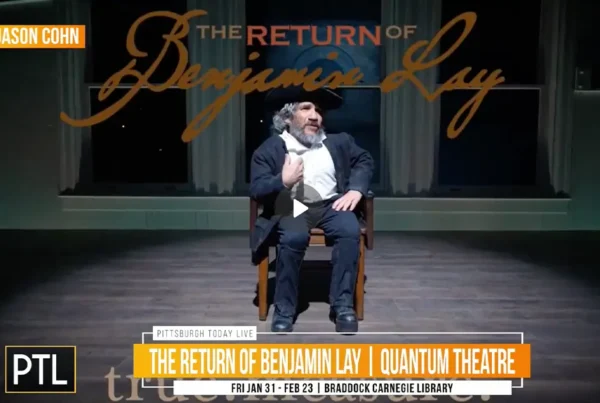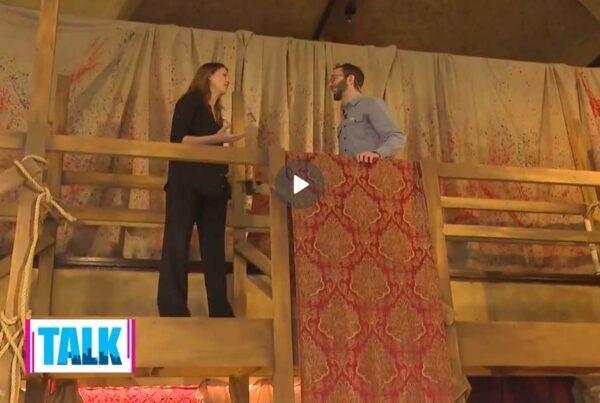Pittsburgh Post-Gazette – On Jan. 7, citizens carrying weapons marched through Pittsburgh streets to demand their rights, and those opposed rallied alongside them. There were no incidents and no cause to believe that any minds were changed.
Before Tree of Life, before Parkland, before the Las Vegas mass murders, award-winning playwright EM Lewis stepped into the debate with “The Gun Show (Can we talk about this?),” a personal solo show. Starting Friday, Quantum Theatre will bring her story to three communities: Carnegie Library of Pittsburgh — Homewood (Feb. 8-17); CCAC-Allegheny Campus, North Side (Feb. 20-24); and The Tull Family Theater in Sewickley (Feb. 27-March 3).
For the show, EM is Ellen, a woman whose complicated relationship with guns began as a bonding experience with her father. Her endgame is to find common ground on which reasonable people can have a discussion.
To make that perfectly clear for Pittsburgh audiences, Quantum Theatre obtained the writer’s permission to add the parenthetical “Can we talk about this?” to the title.
Pittsburgh actor Andrew William Smith (Quantum’s “The River,” Pittsburgh Public Theater’s “Pride and Prejudice”) stands in for Ellen. This is his second time around with “The Gun Show,” which he performed for New York’s new works Project Y Theatre Company, where he served as artistic director. He brought the script to Quantum’s Karla Boos, who gave it the green light.
When Mr. Smith first performed the show four years ago, “the experience profoundly affected me on a lot of different levels, some of which I expected, some of which I didn’t,” he recalls. “Since then, I’ve really let it go, and then things started really bubbling up as a culture.”
The Las Vegas shootings left the actor “feeling helpless and confused,” and he thought, “ ‘I can’t believe I’m here after all that work I did.’ What the play goes after, to bring together two sides that are apart, is 10 times more pertinent now” than when he first performed the show.
In his previous experience, there were talk-backs after some performances, with Mr. Smith present. That became more of a Q&A than a conversation, he says, so Quantum instead will hold post-show chats with a facilitator, asking audience members to share their own thoughts and experiences.
Directing Mr. Smith is Sheila McKenna, a Post-Gazette Performer of the Year and, like Mr. Smith, an educator. (He teaches at Carnegie Mellon University; she teaches at Point Park University.)
“There was something about the play that touched my heart, and it felt so personal from Ellen’s point of view that I could easily imagine the process she was going through,” Ms. McKenna says. “There are layers added to the pining and yearning for conversation ….”
Anything more might spoil the story, which heads into unexpected territory.
In Pittsburgh, “The Gun Show” will be presented to audiences with feelings still raw from the Tree of Life and officer-involved shootings and seemingly daily crime reports of gun violence. We are a microcosm of a country divided among pro and anti- this, that and the other thing, including proponents of gun restrictions, Second Amendment purists and families who see issues through the lens of a long-valued gun culture — and many who fall somewhere else in that mix.
“Doing it for this Pittsburgh audience changed after Tree of Life. What was a traditional approach took a complete reexamination,” Mr. Smith said. “I give a lot of credit to Quantum for adjusting on the fly little things: adding the tagline to the title, changing the marquee look, those sort of things.”
“The Gun Show” is about a woman who grew up with guns and had a certain relationship with them. Although Mr. Smith speaks in his own voice, “I want the audience to really know it is her,” he said of Ellen. “She’s here from Oregon.”
Ms. McKenna’s job is “to be the ideal audience member and support being sensitive to the audience, but we have a story to tell,” the director said. “We think about it in terms of the locations as well, figuring out how to get this story to the most diverse a range of communities as possible. So in the back of my mind, it’s always: Who’s receiving the story, and how can we best keep Andrew in a good, safe, flexible environment, but also to be sensitive to the people who are receiving his work?”
Audience members are asked only to come with open minds. Changing minds and hearts isn’t the point so much as understanding what the person next to you might be thinking or feeling.
“It’s a piece designed for an audience that’s neither left nor right leaning,” Mr. Smith says.
Whichever way you lean, the hope is that when you leave “The Gun Show,” the answer to “Can we talk about this?” will be: “Yes.”




